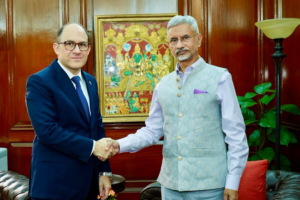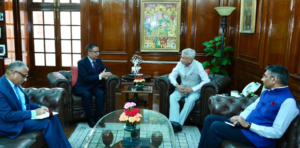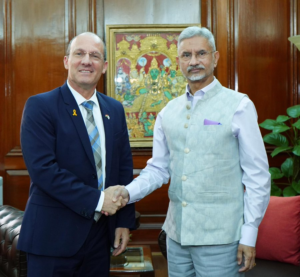Concerns over CAA addressed, ILP should be extended to Meghalaya: CM Conrad Sangma
Shillong, Feb 17 (PTI) Concerns of Meghalaya over the Citizenship Amendment Act (CAA) have been addressed as most areas of the state come under Sixth Schedule which are exempted from the citizenship law, Chief Minister Conrad Sangma said, adding that Inner Line Permit should be extended to the state.
In an interview to PTI, Sangma expressed concern over “spill over effect” in the state if the CAA is implemented and stressed on the requirement for Inner Line Permit (ILP), which will restrict entry of outsiders.
Asked about CAA, which has faced opposition in the state that shares over 400 kms of border with Bangladesh, Sangma said their concerns have been addressed as it excludes Sixth Schedule areas.
“When the CAA had come out in the first draft, there was no provision for exemption for any state. After we raised the concern, we met the home minister, we met other leaders, then there was a revisit in the entire draft and they came up with provision where Meghalaya and other areas with Sixth Schedule and ILP were exempted,” Sangma, who also heads the National People’s Party, told PTI.
“In every area in Meghalaya, except a few square metres in Shillong… a small area which we call European ward, is the only area which is a non-scheduled area. Majority of the state is a scheduled area. Once exemption is there,, we don’t have any concerns. So our concerns have been addressed,” Sangma said.
“We have just requested the Government of India if we can still have the ILP… Because whatever happens in other states could have spill over effect here, we have requested for that. We are happy that Government of India exempted Meghalaya. We have asked if the non-scheduled area can also be exempted, though it is very-very small,” he said.
He also mentioned a resolution passed by the state assembly to extend ILP to the state.
Meghalaya Assembly in December 2019 had adopted a resolution for implementing ILP regime in the state.
The ILP is a special permit that is required by the people from other regions of India to enter the states of Arunachal Pradesh, Nagaland, Mizoram and Manipur.
“Our concerns are that anybody from outside the country is a non-Indian and illegal immigration is illegal immigration. Citizens from other countries coming would be in a way foreigners coming into our country,” he added.
Passed in December 2019 by Parliament, CAA grants Indian nationality to Hindus, Sikhs, Jains, Buddhists, Parsis and Christians from Bangladesh, Pakistan and Afghanistan who arrived in India till December 31, 2014.
Union Home Minister Amit Shah has said rules for implementing the CAA will be issued before the coming Lok Sabha polls.
The provisions of the Act will not apply to the tribal areas of Assam, Meghalaya, Mizoram and Tripura included in the Sixth Schedule of the Constitution.
The Sixth Schedule protects tribal populations, providing autonomy to communities through the creation of autonomous development councils, which can frame laws on land, public health and agriculture.
Asked about Manipur Chief Minister Biren Singh’s statement on deporting those who have came in the state after 1961, Sangma said it is for the state and the Union governments to decide.
However, he added, “The situation in Manipur is complicated and those decisions will have to be taken keeping ground factors in mind. It is for Government of India and government of Manipur to decide,” he said.
“From a practical point of view, it is very complicated. How will they implement that decision has to be equally looked into,” he added.






